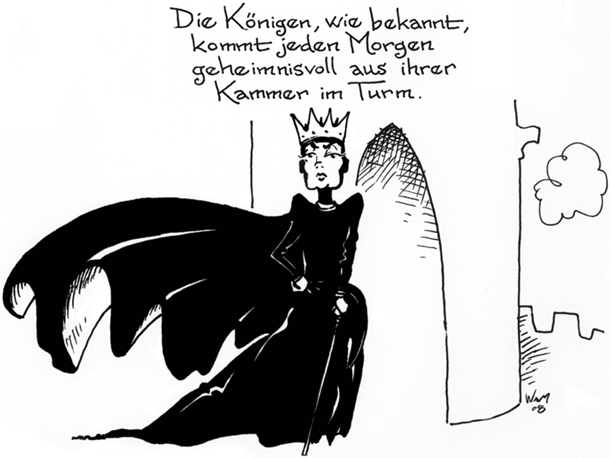![]() Adverbs:Das Adverb: Wann? Wie oft? Wie viel? Wie sehr?
Adverbs:Das Adverb: Wann? Wie oft? Wie viel? Wie sehr?
Adverbs provide information about how, where, when, to what degree, or how often an action takes place. They modify verbs or adjectives or other adverbs. An adverb expresses things like time, frequency, manner, place, quantity, or intensity. Adverbs are placed close to the word they modify (the verb, the adjective or the other adverb). Many adjectives can also function as adverbs in German.
With few exceptions, adverbs don't change their appearance. The form you see in the list below is the form you use in a sentence. Most of them look like adjectives without the endings.
| Die Schneeflocken fielen sanft vom Himmel. | The snowflakes were falling softly from the sky. |
| Als die Königin da saß, stach sie sich zufällig mit der Nadel in den Finger. | As the queen was sitting there, she accidentally pricked her finger with a needle. |
| Sie sah überrascht ihren blutigen Finger an. | She saw her bloody finger with amazement. |
In addition to answering the simple question wie (how), there are several groups of specific adjectives that describe time, frequency, quantity and intensity. There are also other types of adverbs that add information regarding manner, location, or logical sequencing.
![]() Adverbs of time: Wann?
Adverbs of time: Wann?
| heute | => | today | gerade | => | right now | |
| gestern | => | yesterday | ehemalig | => | former | |
| morgen | => | tomorrow | eben | => | just now | |
| gleich | => | in a minute | kürzlich | => | recently | |
| sofort | => | immediately | schließlich | => | finally | |
| schon | => | already | endlich | => | at last | |
| erst | => | only (since) | zuletzt | => | in the end | |
| seit | => | since | bisher | => | up until now | |
| neulich | => | the other day | damals | => | back then | |
| früher | => | back in the day | zukünftig | => | future |
In sentences with more than one time expression, the more general time expression comes before the more specific one.
| Es war im Winter an einem ruhigen Nachmittag. | That was in the winter, on a peaceful afternoon. |
![]() Adverbs of frequency: Wie oft?
Adverbs of frequency: Wie oft?
| manchmal | => | sometimes | regelmäßig | => | regularly | |
| oft | => | often | fast nie | => | almost never | |
| häufig | => | frequently | mehrmals | => | repeatedly | |
| ab und zu | => | every once in a while | kontinuierlich | => | continuously | |
| immer | => | always | stets | => | always | |
| ständig | => | permanently | niemals | => | never, ever | |
| selten | => | seldom | einmal | => | one time | |
| nie | => | never | unregelmäßig | => | irregularly | |
| wieder | => | again | schon wieder | => | yet again |
| Sie dachte ständig an ihr ungeborenes Baby. | She was constantly thinking of her soon-to-arrive baby. |
![]() Adverbs of quantity: Wie viel?
Adverbs of quantity: Wie viel?
| viel | => | much | übermäßig | => | excessively | |
| wenig | => | little | unmäßig | => | excessively | |
| extrem | => | extremely | gar nicht | => | not at all |
| Normalerweise ist das vielleicht ein bisschen extrem, aber sie war doch eine werdende Mutter. | Normally that's perhaps a bit extreme, but she is an expecting mother, after all. |
| Ihre Gefühle sind gar nicht ungewöhnlich! | Her feelings are not at all unusual. |
| Und was heißt überhaupt 'übermäßig'?! Dies ist doch eine Geschichte aus der Romantik - man musste übertriebene Gefühle haben! | And what does it really mean to feel 'excessively?' This was, after all, the Romantic period - you had to have exaggerated feelings! |
![]() Adverbs of intensity: Wie sehr?
Adverbs of intensity: Wie sehr?
| sehr | => | very | wahnsinnig | => | insanely, very | |
| total | => | totally | unglaublich | => | incredibly | |
| fast | => | almost | enorm | => | enormously | |
| beinahe | => | nearly | fabelhaft | => | fabulously | |
| wirklich | => | really | ungeheuer | => | unbelievably | |
| überhaupt nicht | => | not at all | ein bisschen | => | a bit | |
| ziemlich | => | quite |
| OK. Also lesen wir es noch einmal. Da sitzt sie und ist wahnsinnig froh, dass sie ein Kind haben wird. | OK. So, let's go on reading. There she's sitting and she's insanely happy that she's going to have a baby. |
| Ihr geht es wirklich fabelhaft, und nach 9 Monaten (fast 10, ehrlich gesagt) kommt Schneewittchen auf die Welt. | She's doing really fabulously, and after 9 months (almost 10, truth be told) Snow White comes into the world. |
| Laut ihrer Eltern ist sie ungeheuer niedlich und wunderschön! Was können aber Eltern sonst schon anderes sagen? | According to her parents, she is incredibly cute and beautiful! But what else could parents say? |
| Leider stirbt aber die Königin, und so beginnt Schneewittchens Abenteuer mit seiner Stiefmutter. Ein Abenteuer, das dem Mädchen fast das Leben gekostet hätte! | Unfortunately, the queen dies, and thus begins Snow White's adventure with her step mother; an adventure that nearly costs the little girl's life! |
![]() Word order with adverbs
Word order with adverbs
As a general rule, German adverbs appear in this sequence: time-manner-place, although there are some infrequent exceptions to this rule (especially in colloquial speech).
| Die Königin, wie bekannt, kommt jeden Morgen geheimnisvoll aus ihrer Kammer im Turm. | Every morning, the queen, as is well-known, comes mysteriously out of her chamber in the tower. |



